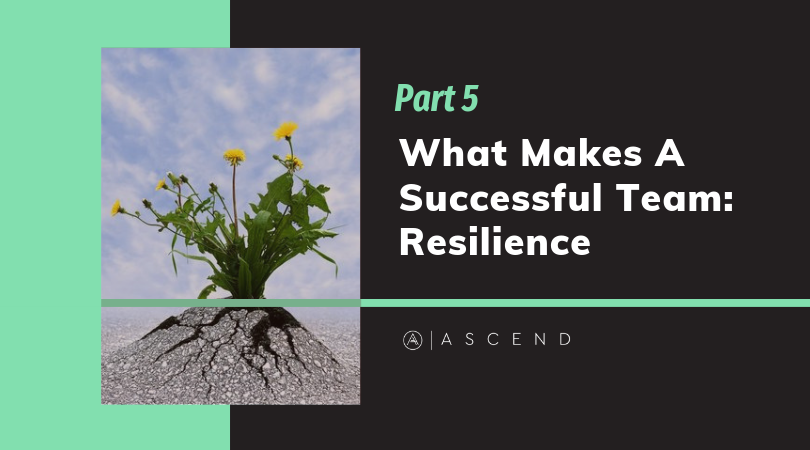Part 5: What Makes A Successful Team: Resilience
Is your organisation about to go into a tough time? Do you want your team to be ready, or are you worried about your team’s performance?
In this article we share the importance of resilience for sustainable, successful teams and organisations, and practice advice on how to enhance your team’s resilience.
What is Resilience and why is it important?
Resilience is a vital element of a high performing, successful team. This is because today’s business environment is volatile, uncertain, complex and ambiguous (VUCA) and it’s paramount that senior leaders and teams are able to perform at their best and bounce back quickly - no matter what.
Successful teams are able to produce great results time and again even when the going gets tough. They are resilient because they remain focused in the face of pressing situational demands and challenges and they have the ability to bounce back quickly from setbacks.
Successful, resilient teams have the following characteristics:
• Continuously able to produce great results when the going gets and stays tough.
• Persistent and remain goal-focused in difficult times.
• Ability to quickly bounce back from setbacks and get back on track even when events or emergencies occur out of their control and without warning.
Teams with low levels of resilience may look like this:
• Senior leaders and team members have a negative and pessimistic mindset.
• Focus on what they can’t control and adopt a victim mentality.
• Are unproductive, focusing on the wrong things and complete work slowly, distracted easily.
• Poor engagement among team members.
• Low energy levels due to lack of sleep, poor health and low mood.
Enhancing your team’s resilience is not always an easy thing to do. We have recognised that teams with a strong resilience have the following three things in common:
1. They pull together when times get tough
A successful team will not wait until hard times to pull together – they support each other and work really well together before a crisis hits. However, when a crisis does hit, they remain goal-focused and support each other to be at their best, when times are not only tough, but when the workloads are high and things don’t go accordingly.
This is because each team member has adopted a growth mindset which means they see challenges as opportunities to learn and improve, to make and learn from mistakes. With this mindset they focus on the things that they can control and work on solving these issues together. Furthermore, they promote a healthy, positive and safe environment, in which health is prioritised and life outside of work is encouraged.
[Read our article ‘Do You Have Growth Mindset Or A Fixed Mindset?’ to find out more about cultivating a growth mindset.]
2. They are tenacious, have grit and perseverance
A successful team gets themselves back on track, even when events or emergencies occur outside of their control and without warning. They remain goal focused in these difficult times and preserve to achieve success.
[Read our ‘Building Team and Personal Resilience’ to discover twelve pieces of advice on increasing resilience].
How can we best increase our team’s resilience to withstand the VUCA environment?
Without employing our Successful Teams Model diagnostic tool, it’s challenging to pin point any one area. However, below are two exercises we really enjoy working on with our clients.
1. Integrating work-life
This exercise will help your team members analyse where they’re spending their time and how they can optimise it to achieving their goals.
Ask yourself or your team members the following:
• Approximately where do you spend most of your time - work, close relationships or themselves?
• What does perfect look like for each area?
• Where are you now and what do you need to do to get to where you want to be?
2. Demand-support constraints
This is a great exercise from a team perspective, to help them to understand what they can influence and how they can minimise the things that are constraining their performance.
Ask your team the following questions:
• What are the demands of your job at the moment and over the next six months?
• What do you have in your environment to help you perform at your best?
• Do you have anything in your environment constraining your performance?
• What strengths do you have that you can leverage to increase your performance?

